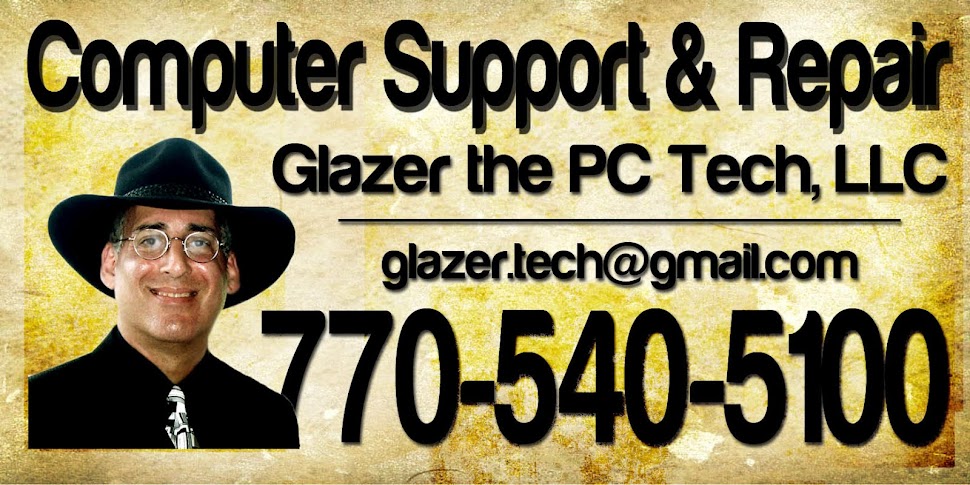arthur@glazerthepctech.com
How do you connect to the Internet? You use a browser connected to an Internet service provider, your ISP. In Gainesville, that usually means most of you use either Internet Explorer or Firefox browsers with AT&T’s DSL (digital subscriber line) or Charter’s cable, both considered to be broadband connections.
If you still have a dial-up connection, stop reading now and call one of those ISPs to upgrade. It’s the second decade of the 21st century. There is no reason to be on a slow dial-up connection anymore. Your browser should show images instantly, not load them line by line.
So which is faster, DSL or cable? It’s like the current cell phone ads. They each claim to be the best.
Actually cable is faster than DSL, but there is a caveat. There is a bottleneck with cable; the more users online in your neighborhood, the slower the connection. DSL, on the other hand connects at a slower, albeit constant speed. If you check your e-mail just before dinner, DSL will probably be faster. But wait until after midnight when there are fewer folks online and cable should prove to be faster.
They are both fast, fast enough and way faster than dial-up, including optimized dial-up.
No matter which service you subscribe to, your modem will fail to forward a signal every now and then. When that happens, it is time to reset the modem. This may occur in bad weather or when local construction or maintenance crews are in your neighborhood causing service to become intermittent.
To reset your modem (cable or DSL), just unplug the power cord from the back of the box for about half a minute. Plug it back in and refresh your browser. You should be good to go.
If you have a wireless router, unplug it for 30 seconds as well. After the time is up, first plug in the modem and wait for the lights to settle down, about 15 seconds. Then plug the router back in. When its lights settle down, refresh your browser and try to get online again.
You could of course, call your ISP’s tech support and wait on hold for 40 minutes only to eventually get an agent. They will tell you what I just did. Why the ISPs don’t make this fix general knowledge, I’ll never know.
Unplug the modem and router if you have one. Wait 30 seconds on each before plugging them back in, and then refresh your browser. It is that simple.
Speaking of browsers, I prefer Mozilla’s Firefox to Microsoft’s Internet Explorer. It is faster, more secure and highly customizable. It has a Google search bar built in and it is even customizable. There is a plethora of add-ons and themes for Firefox, all free to download. It will even save your passwords if you want it to.
For those of you who just use vanilla-flavored browsers, add-ons allow you to customize page appearance, your connection speed, the tabs, your bookmarks, not just making things look pretty but making practical improvements while enhancing your browsing experience.
Internet Explorer just recently jumped on the tabbed bandwagon with its new versions. Other browsers like, Opera, Safari and Google’s newcomer, Chrome, are also good options. The latter claims ease of use and efficiency with movable tabs. So if you’re stuck with Explorer just because it came with Windows, take one of the others for a test drive. You may be pleasantly surprised.
The Google search bar is not just for searches. You can convert times, weights, currency, languages and more. If you want to look up a word, simply type in the box “define: your word” and hit Enter. It is very useful.
However wonderful a search engine Google is, Dogpile is better for research. It combines the resources of Google, Yahoo, Ask and Bing, offering a thoroughly comprehensive response to your query.
Whichever service you use to search the Internet, you can fine tune it by using a Boolean search. Click on the advanced link to find it. With a Boolean search, you can add search terms like “and,” “or” and “not.” This drastically cuts down superfluous page hits.
If you’re looking at Greece for example, to search for an upcoming vacation, by adding Boolean terms it can save you from scrolling through dozens of useless hits. Use “Greece not history” or “Greece and tourism” to save time.
For now there is only one Internet. Eventually, the folks who made it will make another and keep it to themselves, leaving the likes of us out of it. They built the information superhighway and are now working on the HOV lane with restricted access.
Could you blame them? They are trying to communicate about particle theories and avoiding cosmic collisions. We clutter it up with You Tube videos and spam.
So whichever search engine, browser or ISP you use, it’s all good. It will all get you there. It will also be a lot faster than it was a few short years ago in the last millennium.
Arthur Glazer is a freelance writer and computer technician in Gainesville. His column appears biweekly. Arthur welcomes your computer questions and ideas for future columns.


No comments:
Post a Comment
Got a Comment - or a quick question...